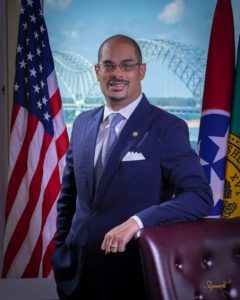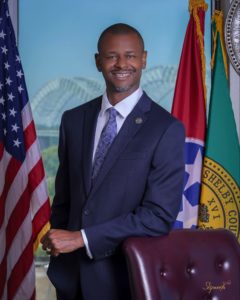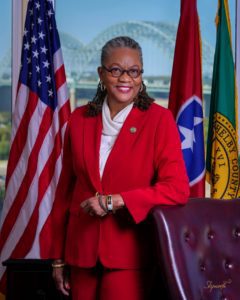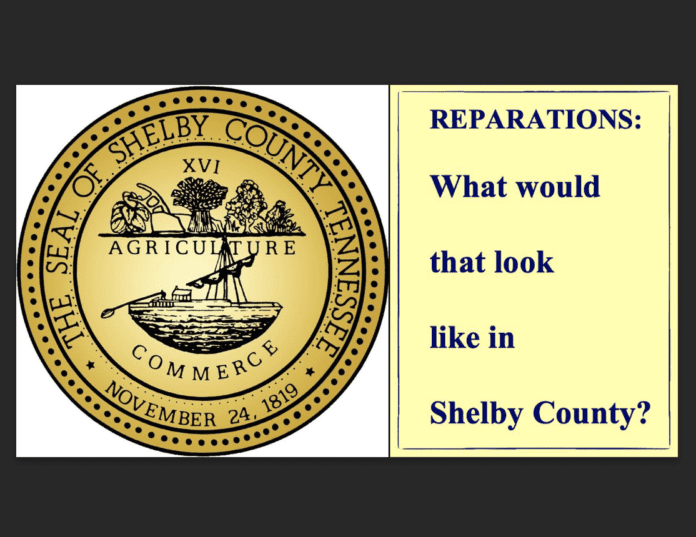Bubbling up out of the Shelby County Board of Commissioners Black Caucus is a resolution calling for a comprehensive study on how reparations would look in Shelby County.

The resolution, which is spearheaded by Commissioner Edmund Ford Jr., is sponsored by all eight caucus members and is scheduled for committee-level discussion on Wednesday. If it makes it to the full commission, seven votes would be needed for adoption.
“With a county commission that has the most females ever and the most African Americans ever, this is the perfect time and the perfect storm in order to proactively study community reparations and actually put some work and items in place that we can act on down the road,” Ford said.
The resolution sets out earmarking up to $5 million “to look at five pillars where African Americans have been disenfranchised over generations.”
UPDATE: On an 8-3-2, the Shelby County Board of Commissioners approved the reparations resolution during its Feb. 22 meeting. The vote authorizes a $5 million feasibility study “to establish, develop and implement reparations.”
Ford said the American Rescue Plan Act could be a source for the funds, adding that there are other avenues for the initial stage outlined in the resolution. The longer-term goal would be to identify a dedicated funding source to continue to fund the pillars beyond the terms of anyone now serving on the commission.
As outlined by Ford, the five pillars are:
- Housing – increasing access to affordable housing, African-American home ownership and receiverships, while providing education to combat practices such as redlining, block-busting, steering and gentrification that hinder communities.
- Mental health and discovering ways to provide affordable healthcare. Also identifying clinical differences between infant mortality rates and life expectancy rates between African Americans and their counterparts.
- Categorizing areas within criminal justice that have shown historical disenfranchisement of African Americans. Also finding holistic solutions to aid those who “have the desire and will to re-enter society without having significant barriers.”
- Enhancing career opportunities and business ownership while promoting higher pay to close the wealth gap.
- Promoting financial literacy, financial freedom, and generational wealth.
As economist Kyle K. Moore with the Economic Policy Institute’s Program on Race, Ethnicity and the Economy points out, “The payment of reparations to Black Americans for slavery and the post-emancipation legacy of intense discrimination has been hotly debated for many years.
“Many see the payment of reparations as the only structural solution to persistent Black-white economic and social disparities, one that we as a country have put off for generations.”
Several cities and legislative bodies have embarked on the reparations path, including Asheville, N.C., Evanston, Illinois, St. Paul, Minnesota, and Providence, Rhode Island. In a blog post last week (Feb. 15), Moore said California’s Reparations Task Force represents the largest state effort to investigate reparations.
“This is our first year in a new term, and we’re talking about things like this now,” said Ford. “We’re working on this right now so that we can have intentional and actionable items to consider. …”
Ford said the resolution reflects a collaboration, with input from all the caucus members. Commissioner Charlie A. Caswell Jr. said the work that the reparations study committee would coordinate is in line with a focus he long has had regarding infant mortality in the community, trauma and mental health.

“I always have studied and researched just why were we in these predicaments of lack of care and resources in underserved communities and knowing the history of how did we get here,” said Caswell, sharing thoughts that he was processing before learning that Ford “was working on something.”
Caswell said after seeing a Harvard University study “that talked about how Black people were highly affected by the pandemic due to lack of receiving reparations,” he started working toward a resolution.
“And when I found out about Ford working on it, we just looked at both of our work, research, and saw that it was a fit to come together on it.”
While the yield from the study committee process would be worked out over time, Caswell said evidence and research already in hand point to things that can be done immediately that “will impact Black and brown people, especially who live in our communities that have been kept from receiving those resources. But yes, I do see it as an ongoing document that will build some capacity around us being able to do some stuff bigger and deeper as more study and research come out of this.”
Commissioner Britney Thornton views the focus on reparations as “a very responsive effort. We’ve seen other cities across the nation choose to really prioritize this and really be ambitious in their reparation packages that they’re trying to construct to benefit their constituencies. I’ve just really been inspired.”

Once she heard the idea introduced by Ford, Thornton said she was gung ho about the concept “that he’s outlined … the five different areas that he’s focusing on. It just sounded like a really great opportunity for us to dig deeper and to start to consider what it looks like to really assess and do capacity-building work within these respective areas.
“It felt like a strong start to a holistic approach to be able to really just help the local Black community get to its next level.”
Thornton stressed that it is a “start.”
“We know that this $5 million is just a start. … This resolution is by no means saying $5 million is all that is due. It’s really just saying we want to equip these respective partners with funds to be able to advance the conversation. I am super excited to see where this conversation goes. …
“We welcome input from stakeholders, supporters, definitely practitioners and service providers in these respective (pillar) areas. So, it’s more of just an all-call and the Black Caucus is here to create space for Black people in Shelby County. It’s a tool….”
As envisioned, a reparations subcommittee would be appointed and operate under the Core City Neighborhood and Housing Committee headed by Commissioner Henri Brooks, whom Ford noted had a history of working on items in the pillar areas that dates to her time as a state legislator and her previous service on the commission.

“I think it’s time. It’s past time (for the focus on reparations),” Brooks said. “We have a number of progressive young people on the commission, well-read individuals who understand that it is time to have that conversation. And when you have that real conversation, then the concept of reparations will be organic.”
Putting in perspective “the institution of enslavement … the aftermath, the laws, the Jim Crow and … even all … what you call the civil rights acts that were passed … and still not enforced … it’s still not giving us the healing, the repairing and actually doing what the legislative intent was. It’s still not happening for us.
“So why is that? Because people are not intentional and they’re not intentional because they don’t understand. That’s my opinion,” said Brooks.
“I see it (the proposed move toward a study of reparations) as a beginning. It’s the beginning of the conversation … toward that repair and healing and trying to rectify the damage that’s been done. Even though it can never be fully rectified, we can at least acknowledge what is happening through that conversation and then get on the road to compensation.
“Because compensation is the only way that we are going to minimize or stop some of the disparities, the gaps, particularly in wealth.”
Caswell emphasized that he sees stepping toward reparations “as something that’s good for all concerned.”
He referenced the economic impact of money being spent on medical trauma and in the criminal justice arena, along with money lost when people don’t have the education and skill sets to fill jobs that come to the community.
“I do see that once we make the case and let people see how it’s affecting our pockets, holistically, that others can, will get on board and not look at this as something just for Black folk and leaving other folks out of it.”
In his blog post, Moore with the Economic Policy Institute detailed five principles for making state and local reparations plans truly reparative:
* Acknowledge and apologize for the harm done.
*Material redress to the beneficiaries.
* Specify what harms are being addressed and who will benefit.
* Don’t attempt to absolve the federal government of its responsibility to provide redress for its harm.
*Include structural change and a commitment to ongoing vigilance against future racial injustice.
Ford envisioned the reparations subcommittee being able to examine those principles as well as what has been explored in other cities and input from myriad other sources in the nine to 12 months it may be at work honing in on the five pillars.
“African Americans historically have been disenfranchised, whether it’s policies that were unjust or otherwise. So, this is the time to do it. And I hope that our constituents at large can see this as something that we are definitely going to work hard in succeeding with,” he said.
“We’re working on behalf of our constituents that we represent to let them know this is something that we want them to embrace. It’s an open door. We want them to participate and at the same time let’s work collectively so that we can make things happen. I’ll say this, when Black people do better, everybody wins.”




